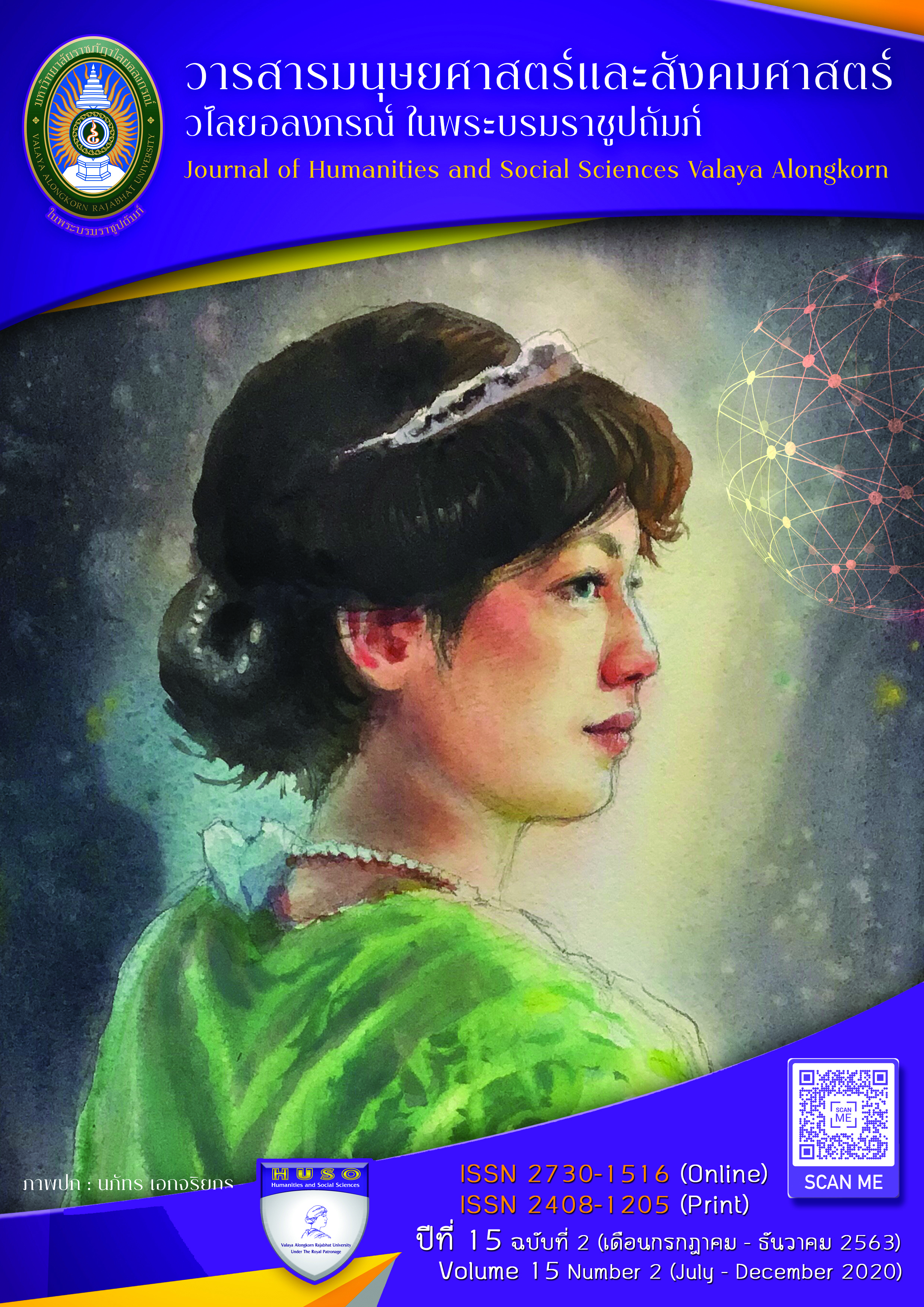THE RELATIONSHIP BETWEEN PERCEIVED ORGANIZATIONAL JUSTICE, RELATIONS WITH SUPERVISORS AND ORGANIZATIONAL CITIZENSHIP BEHAVIOR OF EMPLOYEES IN PRIVATE COMPANY BY ORGANZIATIONAL COMMITMENT AS A MODERATOR
Main Article Content
Abstract
The objectives of this research was to study 1) the relationship between perceived organizational justice and relations with supervisor and organizational citizenship behavior. 2) Study the relationship between perceived organizational justice and relations with supervisor and organizational citizenship behavior In which organizational commitment as moderator. There are 121 samples of people in operation level of a private company. The tools used in the study are tools used to collect data in questionnaires. And the statistics used in the analysis consist of percentage, frequency, mean, standard deviation Pearson's product moment correlation coefficient and hierarchical multiple regression analysis. The results showed that 1) The employees perceived the level of justice in the organization. relations with supervisors and organizational citizenship behavior and organizational commitment at the average of 3.90, 4.18, 4.04 and 3.71 respectively. 2) Perceived organizational justice and relations with supervisor and organizational citizenship behaviors are statistically significant. 3) The organizational commitment as a moderator to control the relationship perceived organizational justice, relationships with supervisor and organizational citizenship behavior
Article Details
ลิขสิทธิ์บทความวิจัยที่ได้รับการตีพิมพ์เผยแพร่ในวารสารมนุษยศาสตร์และสังคมศาสตร์ วไลยอลงกรณ์ ในพระบรมราชูปถัมภ์ ถือเป็นกรรมสิทธิ์ของคณะมนุษยศาสตร์และสังคมศาสตร์ มหาวิทยาลัยราชภัฏวไลยอลงกรณ์ ในพระบรมราชูปถัมภ์ ห้ามนำข้อความทั้งหมดหรือบางส่วนไปพิมพ์ซ้ำ เว้นแต่จะได้รับอนุญาตจากมหาวิทยาลัยเป็นลายลักษณ์อักษร
ความรับผิดชอบ เนื้อหาต้นฉบับที่ปรากฏในวารสารมนุษยศาสตร์และสังคมศาสตร์ วไลยอลงกรณ์ ในพระบรมราชูปถัมภ์ เป็นความรับผิดชอบของผู้นิพนธ์บทความหรือผู้เขียนเอง ทั้งนี้ไม่รวมความผิดพลาดอันเกิดจากเทคนิคการพิมพ์
References
ณัฐสุดา จารุนครานนท์. (2557). คุณภาพชีวิตในการทำงาน พฤติกรรมการเป็นสมาชิกที่ดีขององค์การ และความผูกพันต่อองค์การของพนักงาน: กรณีศึกษา โรงงานผลิตอาหารแปรรูปเนื้อไก่แห่งหนึ่ง. (งานวิจัยส่วนบุคคลศิลปศาสตรมหาบัณฑิต). มหาวิทยาลัยธรรมศาสตร์, คณะศิลปศาสตร์, สาขาจิตวิทยาอุตสาหกรรมและองค์การ.
ธิดา เขื่อนแก้ว. (2554). ความสัมพันธ์ระหว่างการรับรู้ความยุติธรรมในองค์การ การรับรู้การ
สนับสนุนจากองค์การ และพฤติกรรมการเป็นสมาชิกที่ดีขององค์การของพนักงานระดับปฏิบัติการ : กรณีศึกษาโรงงานผลิตชิ้นส่วนอิเล็กทรอนิกส์แห่งหนึ่ง. (งานวิจัยส่วนบุคคลศิลปศาสตรมหาบัณฑิต). มหาวิทยาลัยธรรมศาสตร์, คณะศิลปศาสตร์, สาขาจิตวิทยาอุตสาหกรรมและองค์การ.
นิศารัตน์ ค้าพลอย. (2557). ความสัมพันธ์ระหว่างความสุขในการทำงาน ทุนทางจิตวิทยา
ความสัมพันธ์กับหัวหน้างาน กับพฤติกรรมการเป็นสมาชิกที่ดีขององค์การโดยมีความผูกพันกับองค์การเป็นตัวแปรกำกับ. (วิทยานิพนธ์ศิลปศาสตรมหาบัณฑิต). มหาวิทยาลัยธรรมศาสตร์, คณะศิลปศาสตร์, สาขาจิตวิทยาอุตสาหกรรมและองค์การ.
นภาพร ไพบูลย์วัฒนชัย. (2557). การรับรู้ภาวะผู้นำแบบเปลี่ยนแปลง การรับรู้ความยุติธรรมใน
องค์การ และพฤติกรรมการเป็นสมาชิกที่ดีขององค์การ: กรณีศึกษาพนักงานระดับปฏิบัติการของบริษัทจำหน่ายรถยนต์แห่งหนึ่ง. (งานวิจัยส่วนบุคคลศิลปศาสตรมหาบัณฑิต).มหาวิทยาลัยธรรมศาสตร์, คณะศิลปศาสตร์, สาขาจิตวิทยาอุตสาหกรรมและองค์การ.
สุชนา ฟองอนันตรัตน์. (2560). การรับรู้การสนับสนุนจากองค์การ ความผูกพันต่อองค์การ
พฤติกรรมการเป็นสมาชิกที่ดีขององค์การและความสุขในการทำงานของเจ้าหน้าที่ตำรวจ : กรณีศึกษาเจ้าหน้าที่ตำรวจสังกัดกองกำกับการ 3 กองบังคับการตำรวจสันติบาล 3 กองบัญชาการตำรวจสันติบาล. (วิทยานิพนธ์ศิลปศาสตรมหาบัณฑิต). มหาวิทยาลัยธรรมศาสตร์, คณะศิลปศาสตร์, สาขาจิตวิทยาอุตสาหกรรมและองค์การ.
สุวิมล สุริย์วงศ์. (2554). ความสัมพันธ์ระหว่างการรับรู้ความยุติธรรมภายในองค์การ ความผูกพันต่อองค์การและการรับรู้พฤติกรรมต่อต้านการปฏิบัติงานโดยหัวหน้างาน: กรณีศึกษาบริษัทโทรคมนาคมแห่งหนึ่ง. (งานวิจัยส่วนบุคคลศิลปศาสตรมหาบัณฑิต).มหาวิทยาลัยธรรมศาสตร์, คณะศิลปศาสตร์, สาขาจิตวิทยาอุตสาหกรรมและองค์การ.
Mowday, R.T., Porter, L.W. and Steers, R.M. (1982). Employee-organization linkages:
the psychology of commitment, absenteeism, and turnover. New York: Academic Press.
Mowday, R. T. (1991). Equity theory predictions of behavior in organization. in
steers and porter (Eds.), motivation and work behavior. New York: McGraw-Hill.
Organ, D.W. (1988). Organizational citizenship behavior: the goods soldier
syndrome. Lexington, MA: Lexington.
Sheppard, B. H., Lewicki, R. J. and Minton, J. W. (1992). Organizational justice: the
search for fairness in the workplace. New York: An Imprint of Macmillan, Inc.
Allen, N.J. and Meyer, J.P. (1990). The measurement and antecedents of affective,
continuance and normative commitment to the organization. Journal of Occupational Psychology, 63, 1-18.
Judge, Timothy A & Colquitt, Jason A. (2004). Organizational justice and stress: the
mediating role of work-family conflict. Journal of Applied Psychology, 89, 395-404.
Liden, R. C. and Maslyn, J. M. (1998). Multidimensionality of leader-member
exchange: an empirical assessment through scale development. Journal of Management, 24, 43-72.
Moorman, Robert, H. (1991). Relationship between organizational justice and
citizenship behaviors: do fairness perceptions influence employee citizenship?. Journal of Applied Psychology, 76, 845-855.
Organ, D., W. & Ryan, K. (1995). A meta-analytic review of attitudinal and
dispositional predictors of organizational citizenship behavior. Personnel Psychology 48, 775-802.
Podsakoff, P.M., Ahearne, M., and MacKenzie, S.B. (1997). Organizational citizenship
behavior and the quantity and quality of work group performance. Journal of Applied Psychology, 82, 262-270.
Podsakoff et al. (2000). Organizational citizenship Behaviors: a critical review of
the theoretical and empirical literature and suggestions for future research. Journal of Management, 26(3), 513–563
Schroth, Holly. A. and Shah, Priti. Pradhan. (2000). Procedure: do we really want to
know them? an examination of the effects of procedural justice on self-esteem. Journal of Applied Psychology, 85, 462-471.
Settoon, R.P., Bennett, N., and Liden, R.C. (1996). Social exchange in organizations:
perceived organizational support, leader-member exchange, and employee reciprocity. Journal of Applied Psychology, 81, 219-227
Smith, C. A., Organ, D. W., and Near, J. P. (1983). Organization citizenship behavior:
its nature and antecedents. Journal of Applied Psychology, 68, 653-663.
Wayne, S. J., Shore, L. M. & Liden, R.C. (1997). Perceived organizational support and
leader member exchange: a social exchange perspective. Academy of Management Journal, 40, 82-111.


